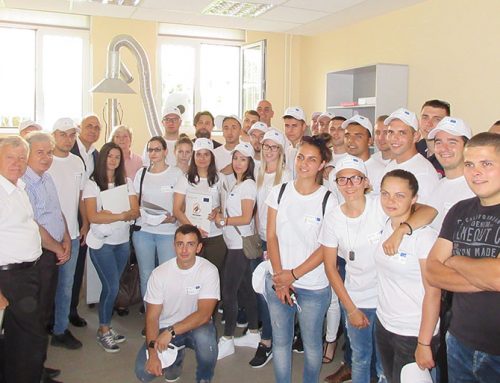The Palliative Care Unit, which is for patients that suffer from severe, life limiting diseases, which are accompanied by chronic pain, offers the possibility of keeping the dignity of the patients and maintaining their quality of life. The Unit offers support to the patients and their families from the moment they are diagnosed with a severe disease up to the moment of intense sadness when the family is saying their last goodbyes. One such unit operates in Zrenjanin General Hospital where patients and their families have only words of praise for the staff.
Radica Jovanovic, a middle-aged man from Vojvodina suffers from a life limiting disease. When he was admitted to the Palliative Care Unit at General Hospital “Dr Djordje Jovanovic in Zrenjanin, his state of health was very bad. After a few days at the Unit, he said he felt much better. Every day he was visited by family members who spent time with him. He followed matches from the Football World Cup on the television in his room. Next to the bed there is a comfortable armchair, lovely curtains on the windows…a warm atmosphere that radiates with peace.
Patients at this Unit are looked after by 1 doctor and five nurses. The long and spacious corridors in this building erected in 1895 are completely spotless. The heat from outside does not permeate through the thick walls. Once upon a time, this was the surgery of the Zrenjanin hospital, and since September 2012, with the financial support of the Ministry of Health, own funds as well as donations, the Palliative Care Unit was opened, covering an area of 440sq meters.

Employees will say that the unit was opened “thanks to successful hospital management,” while management will say that “without the staff, there would never be such a unit which admits all patients from the central Banat area”. Team work at the Unit is evident to everyone – to those that need help as well as members of their family. “When I was admitted I could not eat; they would come back even ten times to ask me to eat, to start living again. Every one visits me, both during the day and at night, and I think the staff’s attitude affects the patient’s recovery more than anything else…one of their smiles is plenty,” says Radica Jovanovic who, although suffering from a severe and life limiting disease is full of life and energy.
The opening of the Palliative Care Unit in the Zrenjanin General Hospital represents a turning point in the health care system of the Central Banat region for patients that for years have struggled with severe diseases which affect the quality of their lives as well as those of their families. Occupancy at the Unit is from 90 to 100%, and most of those admitted are oncology patients, about 95% of all patients.
The Ministry of Health of the Republic of Serbia financed the adaptation of the space for the Palliative care Unit on the first floor. Six patient rooms with a total of 8 beds (4 single occupancy and 2 double occupancy) are located in an area of 440 m2, which also contains bathrooms, a day room for the patients and their families, and staff rooms.
| Large number of ill in Serbia According to statistics from the Belgrade City Institute of Public Health, annually some 8,000 new cases are discovered, while more than 4,600 men and women die. In Serbia, on average some 35,000 new cases are diagnosed annually and some 21,000 die from some form of malignant tumor. |
“We are committed to citizens who suffer from severe, progressive, life limiting diseases with numerous complications. It is not just a question of oncological diseases, but also cardiovascular ones (which account for 56% of cases in our area),” stressed Dr Gordana Kozlovacki, Director of Zrenjanin General Hospital.
The project Development of Palliative Care Services in the Republic of Serbia, financed by theEuropean Union has helped the Zrenjanin hospital significantly. Teams of health workers have attended a series of workshops organized by the Project, and the hospital follows all the indicators developed through the project.

“Half a year prior to opening the Unit, the team which planned to work here underwent specific training organized by the EU project. We are here because we love this job and this is something that each colleague working here would confirm. We love working with patients, and they need our assistance. Here we all work as a team together with the families. Visits are from 8am until 7pm, so that patients spend the greater part of their day with their loved ones. What the patients who come here need most is a kind word. Our conversations with them are really important and we all do our best to spend some time talking to each of them. Our patients are not demanding but they are grateful. Everything means a lot to them from a simple “good morning” to the “goodbye” when they go home,” says Radmila Latinkic, the head nurse at the Palliative Care Unit.
“We rushed to fulfill all the requirements to form and open a palliative care unit. Not because we wanted to be the first in the country, but because our calling is such that it recognizes what society needs. In that sense, we were amongst the first to establish such a unit – and I can proudly say this would not have been possible if it were not for this staff, and team work and interpersonal relationships were not on the list of priorities,” adds Dr Kozlovacki.
| Wonderful people “My husband has skin melanoma and has been in hospital for 18 days. He has dizziness, he cannot eat, so he receives infusion, and what matters most – has 24 hour care. We spend a lot of time here, are with him most moments of the day, but we do not spend the night here. The support of the doctor and the medical staff is significant; they are all wonderful people and deserve all the praise possible. I do not know how it is in other departments, we are in this unit due to our circumstances, everyone is very attentive and caring – from doctor, to head nurse, nurses and cleaning staff,” says Slavica Vucinic, wife of patient admitted to the Unit. |
“Palliative care does not only mean care for oncology patients but also other patients with chronic progressive diseases, however in our surroundings 70-90% of our patients are those who suffer from oncological diseases,” says Dr Nedeljka Boskov, oncologist, Head of Extended Treatment Unit and Oncology Department. The hospital in Zrenjanin has made a plan on how to look after patients that need palliative care, especially those that have lack of pain management, nausea, opstipation or other symptoms of chronic diseases so as to be admitted into the Unit.”In some cases, where the patient in question has been seriously ill for a long time, if he fulfills the required preconditions, we admit him to the Unit so that we can give the caregivers who are constantly carrying the burden of caring for a severely ill patient a respite and a chance to recover so that they can continue taking care of the patients when he returns home. And this is certainly most beneficial. We have on staff a psychologist, physician and physiotherapist, as well as a social worker and priest which come when needed,” adds Dr Boskov. One of the most common reasons for admittance to the Unit is unregulated cancer pain. For this reason, home care services in health care centers are so important since they represent a great support to patients that endure pain and are not accommodated in hospital.



